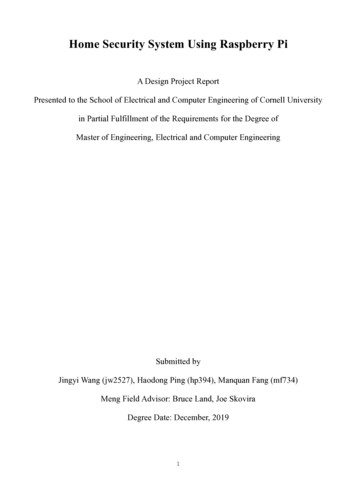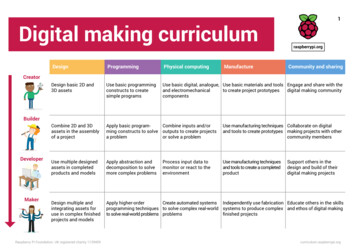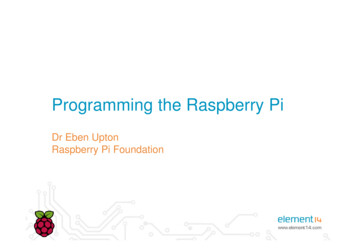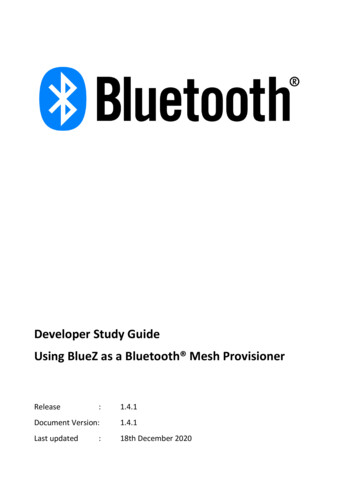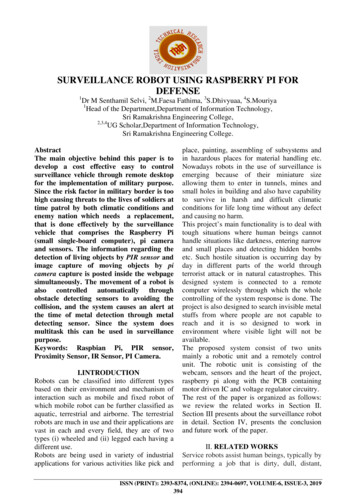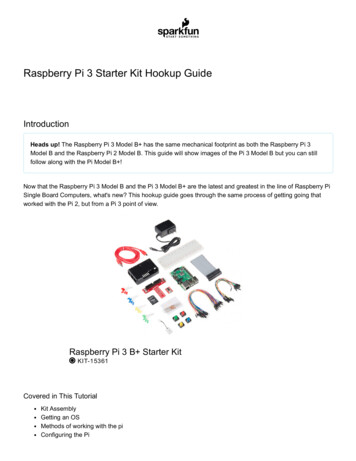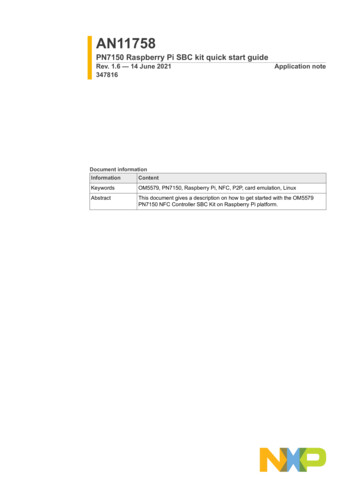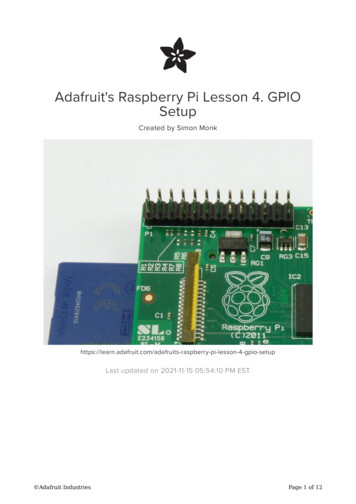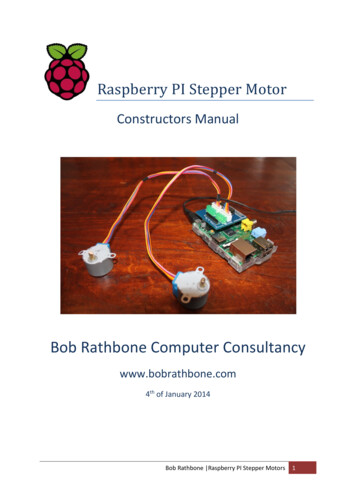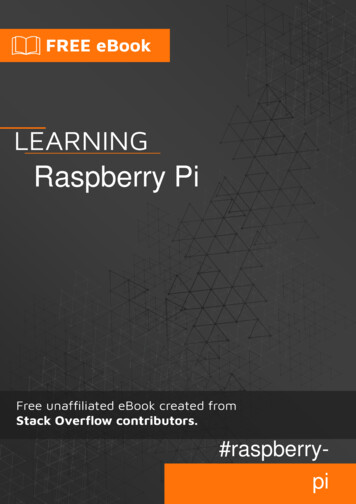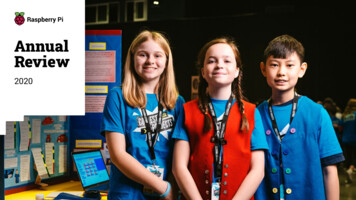
Transcription
AnnualReview20201
CONTENTSIntroduction4Impact highlights6Engaging millions of young people8Learn at Home campaign22Supporting hips5423
INTRODUCTIONFrom Foundation ChairJohn Lazarthese past few months and seeing first-handtheir commitment to our mission and expertise.in users, with more than 29,000 studentsand teachers registered and over 1.2 millionquestions attempted.Welcome to the 2020 AnnualReview for the Raspberry PiFoundation.In a year dominated by a global pandemic thathas wrought devastating health, economic,and educational impacts across the world, ourmission to democratise computing has neverbeen more relevant.lives than ever before. The accelerating paceof digital transformation makes it even moreimportant that all young people, whatever theirbackground, have meaningful opportunities tolearn how to create with technology and that priceisn’t a barrier to anyone owning a computer.“Our missionto democratisecomputing has neverbeen more relevant.”Against this backdrop, we helped millions ofyoung people to keep learning and having funwith technology in 2020, including throughour free online digital making projects andchallenges like Astro Pi. While the majority ofCode Clubs and CoderDojos were unable tomeet in person due to the pandemic, we sawfantastic examples of innovation as thousandsof clubs moved online, enabling young people tokeep learning and creating together.Over 1.5 billion young people were unableto access learning through schools or clubsdue to the restrictions put in place to limit thespread of Covid-19. While teachers and parentsperformed heroic feats to support young peopleto learn at home, the impact on young people’seducation has been significant and particularlyserious for those young people who alreadyexperienced educational disadvantage.Through our partnership with Oak NationalAcademy, we produced more than 300 videolessons, linked to our comprehensive TeachComputing Curriculum, which have been usedby thousands of schools to help their studentscontinue to learn at home. Our Isaac ComputerScience online platform saw a huge increaseAt the same time, computers and digitaltechnologies have played a more vital role in our4The Raspberry Pi Foundation and our groupcompanies are supported by an incredibleteam of Trustees, Members, and independentDirectors. This year we welcomed three newTrustees — Amali de Alwis, Charles Leadbeater,and Dan Labbad — each of whom bringssignificant experience and expertise to theBoard. I am deeply grateful to all Trustees foreverything they have contributed to our work.As part of our renewed commitment to diversityand inclusion across everything we do, weredoubled our efforts to support young peoplewho experience educational disadvantage,including through expanding our partnershipswith youth and community organisations andour Learn at Home campaign.Through our research symposium and series ofresearch seminars, we have ensured that ourpractice is informed by the best research, andwe’ve created a platform and community thatis helping to advance the field of computingeducation more broadly.I want to pay a special tribute to David Cleevely,who preceded me as Chair of the Foundationand made a huge contribution over more thansix years. David stepped down in October2020 at the end of his term of office, and Iam delighted that he continues to be involvedas a founding member of the Raspberry PiSupporters Club.It was another record-breaking year for the saleof Raspberry Pi computers, aided by the launchof the Raspberry Pi 4 8GB, the Compute Module4, and the Raspberry Pi 400. We ended theyear with 37.4 million Raspberry Pi computersin the world, being used to transform industryand education in ways we could never haveimagined. We have been particularly proud tosee Raspberry Pi computers used to develophealthcare innovations that are contributing tothe global effort to fight Covid-19.Raspberry Pi is a unique institution that isboth one of the world’s leading technologycompanies and education non-profits. Weare proud to be part of a movement oforganisations and individuals that share ourmission and help bring it to life through theirresources, time, and expertise. Thank you toeveryone who has contributed to our impact in2020. We look forward to achieving even moretogether in the years ahead.I joined the Foundation as Chair of the Boardof Trustees in October 2020, and it has been ahuge pleasure getting to know the team over5
y young people ran inspace through Astro Pi70,000participantsin our onlinecourses in 2020learners engaged withour online projectsfrom39 countriesshowcasedprojects in ourCoolest Projectsonline gallery35026kpeoplefrom 25 countries tookpart in our research events1Mteachers from 12,000 schoolsin England supported throughthe National Centre forComputing EducationOVERquestions answered on ourIsaac Computer ScienceA level platform36,000subscribers toHello World6&10,000subscribersto our othermagazines37.4220kdownloadsof our Teach ComputingCurriculum resources forteachers7MILLIONRaspberry Pi computerssold to date220SCHOOLSengaged in our research ongender balance in computing
Engaging millionsof young people tolearn computingand digitalmaking89
DIGITAL MAKING PROJECTSMillions of people use our free online resourcesto learn computing and digital making skillsWe’ve created more than 250 free onlineprojects that people all over the world useto learn about computing and how to makethings with digital technologies. The projectscater for everyone from beginners to moreexperienced learners, offer learning with awide variety of hardware and software, and areused in schools, in clubs, and at home. Theyare written by expert educators, and reflect thebest evidence about how people learn.We structure our projects into pathways thatsupport progression and offer real-worldcontexts to make learning more engaging andaccessible. In 2020, we added 17 projectsin new pathways focused on well-being, theenvironment, and machine learning withPython. In these new pathways, learnersengaged in more than 100,000 learningexperiences in 2020.72& 8.84.9MILLIONMILLIONlearners259projectsvideos releasedas part of DigitalMaking at Home,learningexperienceswith.171456new projects published53,000viewers acrossYouTube andFacebookproject translationsDigital Making at HomeTranslationsWe launched a new video series this year tocomplement our online learning resourcesand to inspire and engage young people.Each week, Digital Making at Home takesyoung people through fun, creative projectsand introduces them to real-life role modelson a live stream, which is also publishedon YouTube. In 2020, 53,000 viewers tunedinto the weekly videos, and total Facebookimpressions for Digital Making at Homereached 960,000 by the end of the year.We know that making our learning resourcesavailable in local languages increasesaccessibility, particularly for young people whoare socio-economically disadvantaged. Wewrite our projects in English and work with acommunity of more than 2000 volunteers totranslate them into up to 32 different languages.This year, we ran our first translation hackathonsupported by Atlassian, in which 150 volunteerscreated 180 project translations. Learnersengaged in 375,000 learning experiences inlanguages other than English in 2020.11
CLUBSA global network of computing clubs that helpyoung people learn how to create with technologyall over the world to prevent the spread ofthe coronavirus.Code ClubCode Club is a global networkof free computing clubs for 9- to13-year-olds run by volunteersand educators. Code Clubs typically take placein schools and offer a fun, informal space foryoung people to learn computing skills and getcreative with technology, making everythingfrom animations and websites to games anddigital art.From April 2020, we supported more than1000 Code Clubs and CoderDojos to deliveronline activities to their learners. We producednew guides for volunteers and educators,updated our safeguarding guidelines, and heldcommunity calls and training webinars to sharebest practices for running online sessions andremote activities for clubs.In countries where social distancingrestrictions have been relaxed, we have seena rapid return to Code Clubs and CoderDojosmeeting in person, including in Japan,Australia, and New Zealand. We continue towork closely with the network of 52 CodeClub and CoderDojo partner organisationsto support the safe return of in-person clubsessions as social distancing restrictions arerelaxed around the world.CoderDojoCoderDojo is a globalcommunity of free, communitybased programming clubs foryoung people aged 7 to 17. CoderDojos are run byvolunteers in informal, social environments andoffer young people opportunities to create withcode, learn new skills, and collaboratively createsolutions to problems that they care about.Despite the challenges, in 2020 more than 2100individuals participated in our online trainingcourses for setting up a Code Club or CoderDojo,and 1500 volunteers and educatorsaccessed our training webinars.At the start of 2020, there were more than10,000 Code Clubs and CoderDojos, attendedby more than 150,000 young people each week.Clubs were significantly impacted by the socialdistancing restrictions that were put in place1213
CLUBS“ Despite the challenges, in 2020more than over 2100 individualsparticipated in our onlinetraining courses for setting upa Code Club or CoderDojo.Code Club leader Ana”When West NorwoodLibrary in London, UK hadto shut in March 2020,librarian Ana and volunteersAbby and Viktor decided to continue theirpopular Code Club sessions online. They rantwo sessions every week, split into activitiesfor beginners and more experienced members.More than 20 young people regularly attendedthe club sessions and continued to develop theirprogramming skills.Mark and his fellow volunteers led young peoplethrough projects in real time, as well as regularlyemailing them ideas from our Digital Making atHome activities. They worked hard to keep theirclub members engaged and interested while athome during the lockdown.CoderDojos in the NetherlandsThe Dutch CoderDojo community cametogether during the pandemic to support eventsto continue online. They used videoconferencingto run large events, with breakout rooms so thatthey could give more tailored support to youngpeople in smaller groups.“It has really been fantastic for us to be ableto offer the children the opportunity todevelop their skills and creativity, whichis not only great fun but also a way ofopening their minds to a future career inprogramming.”As a community, they sent out emails toCoderDojo participants across the countryto keep them informed about online events,and recorded video tutorials for them to workthrough at their own pace. Some eventsfocused on taking all young people through asingle project, while other events were moreopen-ended.– AnaCoderDojo leader MarkAs well as working full-time and supportinghome learning for his own children, Mark tookhis CoderDojo in Banbridge, UK online duringthe pandemic. Event frequency stepped upfrom twice a month to weekly, and the sessionsalternated between being led by an adult oneweek and being led by a young person the next.1415
COOLEST PROJECTSA global showcase of creative projectsmade by young peopleCoolest Projects is the world’s leadingtechnology fair for young people. It brings youngpeople together to showcase the amazingprojects that they have created with digitaltechnologies. Sharing and learning from eachother is at the heart of Coolest Projects, withyoung people exhibiting year on year, creatingincreasingly advanced projects each time asthey learn and develop their skills.Projects online, open for young people anywherein the world to share their creations through adigital showcasing platform.We were delighted to see 775 young peoplefrom 39 countries take part, entering a totalof 560 projects, including websites, gamesand animations in Scratch, mobile apps, andhardware builds. A significant proportion ofthe projects were focused on social changeand solving real-world problems, addressingtopics such as the environment, healthcare,and social justice.In March 2020, we held CoolestProjects USA at Discovery CubeOrange County in SouthernCalifornia, with 149 youngpeople taking part, which wasan increase of 22% from 2019.The panel of special judges included LimorFried, Tim Peake, Mitchel Resnick, Dr HayaatunSillem, and Eben Upton, who each picked theirfavourite projects.Coolest Projects 2020 was supported bygenerous sponsors including BNY Mellon;Blizzard Entertainment; Broadcom Foundation;CanaKit; EPAM Systems, Inc.; Facebook; LibertyGlobal; MathWorks; PayPal; and Twitter.When it became clear that we wouldn’t beable to host the in-person Coolest Projectsevents that were planned for other countries,we pivoted the model and launched Coolest1642%of online showcaseparticipantswere girls560775projectsenteredyoung peoplefrom 39 countriesshared projects inthe online showcase17
COOLEST PROJECTSCoolest Projects onlineentries per country1819319
THE EUROPEANASTRO PI CHALLENGESCOUTSGiving young people the opportunityto write computer programs that runin spaceDeveloping computing and digitalmaking skills through a StagedActivity BadgeAstro Pi gives young people the opportunityto write programs that are run on RaspberryPi computers onboard the International SpaceStation (ISS).We work with the Scout Association in the UKto support their Digital Maker Staged ActivityBadge. The badge introduces digital makingto young people and adult volunteers. Thefirst stages of the badge involve engagingwith uses of digital technology in everyday life,giving instructions to computers, and creatingsimple programs. Later stages involve usingprogramming and electronic componentsto create something that could be used in aScouting activity, and to help others to solvereal-life local or global problems. We providefun learning resources and projects to supportbe run on the Astro Pi computers, makinguse of their sensors or camera. The mostaccomplished projects are run on the ISS, andthe data is returned to Earth, where teamsanalyse it and produce scientific reports oftheir findings. The ten teams that write the bestreports are selected as the Astro Pi MissionSpace Lab winners.Mission Zero is open to young people up to theage of 14 who write a simple Python programthat measures the temperature on the ISS anddisplays a message on the Astro Pi computers.All eligible entries are run aboard the ISS.Mission Space Lab is a scientific mission foryoung people up to the age of 19. Entrantsdesign and program an experiment that canThe European Astro Pi Challenge is an ESAEducation project run in collaboration with theRaspberry Pi Foundation.OVER655940% 17,197of participantswere girlsprograms writtenby young peoplewere run on theInternationalSpace Stationyoung peoplefrom 25 countriestook part20OVER28,000Digital Maker StagedActivity Badgesawarded in 2020OVER43,800views anddownloads of ourDigital Maker StagedActivity Badgelearning resourcesyoung people and Scout leaders to workthrough the stages and meet the requirementsto earn the badge.In 2020, we supported two large online Scoutevents, The Great Indoors Weekender andGilwell Reunion 2020.Italian ESA astronautLucaParmitanosupported ourmissions fromthe InternationalSpace Station21
Learn at Homecampaign2223
LEARN AT HOMECAMPAIGN1700Providing computers for disadvantagedyoung people to learn at homeAs part of our response to the pandemic,the Raspberry Pi Foundation partnered withUK Youth and a network of grassroots youthand community organisations to put RaspberryPi desktop kits (with monitors, webcams, andheadphones) into the hands of disadvantagedyoung people in England and Scotland whodidn’t have a computer to learn at home.needed worked out of the box, and we provideda customised operating system image withfree educational resources and enhancedparental controls.The impact was immediate: young peopleengaged with learning; parents reportedpositive changes in their children’s attitudeand behaviour; and youth and social workersdeepened their relationship with families,enabling them to provide better support.The impact wasimmediate: young peopleengaged with learning;parents reported positivechanges in their children’sattitude and behaviour.This programme was supported by generousdonations from more than 70 organisationsand individuals, including top-tier donors theBloomfield Trust, the S&P Global Foundation,Checkout.com, Tim and Jax Parsonson, andAppleyard Lees. We have so far raised morethan 900,000 in donations, which will enable usto distribute 5000 computers to young peoplewho don’t have a computer to learn at home.This wasn’t just about shipping hardware, wealso trained youth workers and teachers, andwe worked closely with families to make surethat they could set up and use the computers.We did a lot of work to make sure that theeducational platforms and apps that they24Raspberry Pi kitsdistributed to youngpeople in 2020“The pandemic has highlighted the issue ofthe digital divide, but it has always beenthere. The Foundation’s ability to providehelp and support, and their commitmentto playing their part in addressing thislong-term problem, made backing themfor this project a no-brainer.”“– Martin Hellawell, Bloomfield Trust“Going into Year 11, it is a really important timeat school. Due to coronavirus, my whole yearhas been sent home and given online lessons,which I can now do.”60%68%of young peoplereported spendingmore time ontheir schoolworksince receiving acomputersaid that havingaccess to thecomputer changedhow they felt aboutdoing schoolworkYoung people reported using thecomputers for videoconferencing forschool lessons, accessing online learningresources, and learning computing skillssuch as programming“It makes it so much easier to get my workdone, I don’t have to stay behind at school.I can come home and do it.”“I feel so positive, like I can spend quality timeand not get rushed to do my work, as I usedto do it on my mum’s phone, and then sheneeded it too.”“Now I get to research and get the correctanswer, where before I used to guess moreanswers. I feel like I’ve improved and I’munderstanding more.”25”
Supportingschools toimplementcomputing2627
NATIONAL CENTRE FORCOMPUTING EDUCATIONSupporting computing teachersand students in EnglandThe Raspberry Pi Foundation is part of aconsortium — together with STEM Learningand BCS, The Chartered Institute for IT — thatis running the National Centre for ComputingEducation in England. This is a governmentfunded initiative providing comprehensivesupport for schools and colleges in England tooffer a world-leading computing education, fromKey Stage 1 through to A level.Through the National Centre for ComputingEducation, we are supporting teachers byproviding an extensive range of professionaldevelopment and certification, bursaries fortraining, curriculum and teaching resources,community support, and more.26,000 11,0003 MILLION 2 MILLIONOVERteachers supportedfrom over 12,000primary andsecondary schoolsin EnglandOVERteachers in Englandtaking part inonline professionaldevelopmentvisits to theteachcomputing.orgwebsite28students inEngland reached29
TEACH COMPUTINGCURRICULUMOVER220,000Comprehensive classroom resources forthe entire computing curriculumIn 2020, we launched the Teach ComputingCurriculum, which includes almost 500 hours offree classroom resources to support teacherswith the delivery of the entire English computingcurriculum from Key Stages 1 to 4 (ages 5 to16). The resources include lesson plans, slides,worksheets, homework, and assessmentmaterials, and are designed to reduceteachers’ workload, whilst also supportingthem to improve their subject knowledge andunderstanding of effective teaching approaches.It’s all free, open, and editable (under an OpenGovernment Licence) so that teachers can tailorit to their students and school setting.We also made sure that the content is suitablefor all students irrespective of their academicperformance, background, and additional needs.The Teach Computing Curriculum is part ofthe National Centre for Computing Education,which is funded by the Department forEducation in England. The resources arecompletely free for any students and teachersanywhere in the world.“I would like to start by sayingyour resources for the secondarydepartment have been excellentand a great help for my studentsand I. They have made planningso much easier as a nonspecialist computing teacher,so thank you!”We built the Teach Computing Curriculum onan innovative progression framework wherecomputing content (concepts, knowledge, skills,and objectives) is organised into interconnectednetworks that we call learning graphs; all thecontent is mapped to exam board standards.– Computing Head of Department,Secondary30492 hoursdownloads sincethe launch750,000100%of resources in theTeach ComputingCurriculumpage viewsacross the TeachComputingCurriculumresourcesof the Englishnational curriculumfor computingcovered“It’s great that there are resources availablethat have everything we need. It gives agood foundation that, as we gain moreconfidence, we can build on it.”“”– Primary Teacher97.5%satisfaction that thecontent is useful andof high qualityTeach Computing Curriculumpage views by Key StageFrom launch in September to the end of 2020Key Stage 1170,000Key Stage 2270,000Key Stage 3190,000120,000Key Stage 40100,000200,00031
ONLINE TRAININGFOR EDUCATORSCourses to develop computing subjectknowledge and skillsWe are grateful to the Department for Education,Google, and Micron Technology for theirfinancial support, which makes our onlinetraining for educators possible.Through our free online training courses,the Raspberry Pi Foundation is supportingeducators to develop the subject knowledgeand pedagogy to support young peoplelearning computing, computer science, anddigital making. The courses are free foranyone to access and are hosted on theFutureLearn platform.In 2020, we ran 33 individual courses, with atotal of 103 course runs, serving a total of over70,000 learners worldwide, which is more thandouble the number of learners in 2019. Sincewe launched the first course in 2016, we haveserved more than 160,000 learners throughour online courses.Teachers in England can use our courses towork towards professional certificates as part ofthe National Centre for Computing Education.“The course just demystifiedmaths and logic. The teachingideas and provided resources foroffline and online learning werehelpful for me, and something Iwill use in teaching.”““I have definitely learnt many different uses ofScratch, which would be interesting to use inschool and also different ways of achieving anend result.”“I think the course has been very clear and wellstructured, providing both key knowledge butthen also requiring further research throughthe questions that have been posed. I’d say thecourse has given me a broader understanding.””3279%of learners said theywere more confidentin their computerskills after havingtaken partOVEROVER70,000 11,000teachers in Englandtook courses as partof their certificationlearners participatedin our online coursesin 2020, and over160,000 since 20163333COURSESran in 2020NEW6COURSESran for the firsttime in 2020
ISAAC COMPUTERSCIENCE“For the majority, thishas been a godsend inthis pandemic situationto facilitate distancelearning.”Supporting students and teachersof advanced computer sciencequalificationsIsaac Computer Science is our online platformfor students and teachers of advancedcomputer science, developed in collaborationwith University of Cambridge researchers inonline learning and designed for use in theclassroom, at home, and for revision. Studentswork through a range of questions at theirown pace, tracking their progress and workingtowards better exam results. Teachers savetime on marking and identify areas for furthersupport by following their students’ progress.year, with 27,000 registered students and 2200registered teachers on the platform, and over1.2 million questions answered.Alongside the platform, we offer events tosupport teachers and students to explore A levelcomputer science. Our Teacher CPD eventstypically take place in partner universities andprovide teachers with focused demonstrationson a particular topic. Student Booster sessionsoffer targeted activities related to particularaspects of the A level syllabus, and StudentMasterclasses give students an insight into theapplications of computer science in an engagingcontext, such as developing a heartbeat sensor.In 2020, we hosted 90 events, both onlineand face to face, with participation from 508students and 510 teachers.We launched the platform in September 2019and completed 100% coverage of the AQA andOCR A level computer science specificationsin March 2020. It’s been a remarkable first full“Particularly in thischallenging time, IsaacComputer Science has helpedme progress despite not beingin school. The quality of thewebsite and the content is byfar the best online.”Isaac Computer Science is part of the NationalCentre for Computing Education, which is fundedby the Department for Education in England.““I love it. It makes me feel more confident that Iunderstand everything for my exam. I really lovethe fact that the spec has been broken down soI really know what I should learn for my exams.”34”OVER“Very useful, resourceslike this are difficult tofind so this website isan important learningresource!”1.2MILLIONquestions answeredon the platform100%88%72%coverage of theAQA and OCRspecifications forA level computerscienceof teachers ratedthe platform as highquality and63% said that itsaves them timeof students reportedthat they wouldrecommend theplatform to their peers27,000registered studentsand 2200 registeredteachersStudents registering on Isaac Computer Science anuary202035April2020July2020October2020
OAK NATIONALACADEMYOnline computing lessons tohelp students learning at homeIn the summer of 2020, we filmed 313computing video lessons for students, whichwere published as part of Oak NationalAcademy, a project to provide high-qualityvideo lessons for children in England not ableto attend school due to the pandemic.313 videolessonson the Oak NationalAcademy platformbased on theTeach ComputingCurriculumThe lessons are presented by experiencedcomputing teachers, including many whowork here at the Raspberry Pi Foundation.They are based on the Teach ComputingCurriculum and include quizzes, worksheets,and creative activities.146,000lessons started,averaging 145users per lessonAll of the video lessons and materials areavailable for free for students and teachers onthe Oak National Academy website.3637
HELLO WORLDNGTI RSP U TOM AUMCO UC CUL le nowI ilabR EDREL eOR vaF GOD odCU 16 aE INM gcIN AKNGs 5 to CK tigatin ION itZIT eA MO sT mPU or agBL inveCA sumAG LM TA COMons f THErk for EDUlobalgE IGIossGaHewHeIN omT &DmAC LfraUT rt frTEThe magazine for computing anddigital making educatorsATYUIEQorwlo0GIN DTU ILPM EWOC THINlhe022ptSeINResources to support teachers’professional developmentPM repoCO Acc.ldHello World is a free magazine for educatorsall about computing and digital makinginside and outside the classroom. It includesinspirational projects, news, lesson plans, andopinion pieces. Hello World is a communitymagazine, and every issue has contributionsfrom educators and researchers, includingpractising teachers. The magazine is availablefor free online for everyone, and UK-basededucators can receive a printed copy to theirhome address free of charge.14ueIss:NGHI RSAC OOOC TDGE S OUTO NTON DETI TUVA R SER OUSYN TCO GETSBO ESKE RIFA A LIBRAROM TO EDSFR EASRE LEIDCO EN ITESSHTC E BRA S WSC S CLASPE M YGTNEO LUER CUTI RSST RRIP U TONG URI Y CAMEERCEN ECO UGI VOD tionEN ECOR EDOCduca SNG RFO N GKI H ionEA IPSUDe in eEIPREsB RsIN AKPS its u GRAogres N E S U A L TAZ MIG ds U R I R TG prOF forAG LE ence NINshow DESs’ neLeE C T VCM ITASrtidN vR ae EE TE IGFE E LEAps th E BYlearn F RE S P O RTH & DaDEMIV our ld.cc)INUSt all yelloworLC ee (hIN to m 1inginkthiniftshAPLWe published three editions of Hello World in2020, including a special edition in June focusedon providing support and guidance to educatorsteaching remotely. Subscriptions grew byalmost 7% in 2020 to just over 36,000.UScc.ldorwllor2Ap12ueIssHello World is produced by the Raspberry PiFoundation and generously supported by Oracle.92%PEDAGOGY QUICK READS & THETEACH COMPUTING assroom action research is an effective approach that teachers canuse to embed evidence-based pedagogies into their practice. Thisapproach is the subject of the new online course:Improving Computing Classroom Practice Through Action Research.To understand behaviour and how it changes as a result of your actionresearch, you can use different types of observation techniques. Thetechnique chosen will depend on your research question and the typeof action you are taking in your research.AINGStructuredUnstructured Behaviours areidentified beforethe observationEAGGUsNitieAL L G activNGRASSINodingchNI YUAR TRT E d c teLE OEED G PNA ROC-base e theSNAP ck lor-B TICT UJE MPRO CO P S SCEECH WiPsOA MYmPR ROFLithAP TS FER D? algorNT IGHTEM HLT IR nSS IGBU R B ificatioedSE HASO lass ystifiY IONDA C ATC mYR UdeVE ED E GVE INNGDI UTRI GO tsEP OMPUED CT A den AIED NH u fST S IOM LP r st ry oOF OKFR O A e youhistoAN BODE REIT spir theSIN ICTUIn ithPwc)of subscribers reportedusing content from themagazine in their teachingPedagogy Quick ReadsUsing observation techniques to recordstudent behaviour for research or evaluationObservationsR GTE KINAS RM WOLD EROU NSH E INSHNT TDEUSTNHIPedagogy Quick Reads and the TeachComputing podcast are
of Raspberry Pi computers, aided by the launch of the Raspberry Pi 4 8GB, the Compute Module 4, and the Raspberry Pi 400. We ended the year with 37.4 million Raspberry Pi computers in the world, being used to transform industry and education in ways we could never have imagined. We have been particularly proud to
